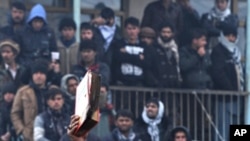A prominent American newspaper says a series of events that led to the burning of Qurans at a NATO base in Afghanistan last month could have been stopped at several points "along a chain of mishaps, poor judgements and ignored procedures."
The February 20 book burning at Bagram Air Base sparked days of violent anti-American protests across Afghanistan that left at least 30 people dead and frayed relations between the U.S. and Afghanistan.
The New York Times quotes a U.S. official close to the joint Afghan-American investigation into the incident as saying at least six people involved in the Quran burning, including "American military leaders" and an American interpreter, could face disciplinary action.
The newspaper says about a week before the burning, military officers became concerned that detainees at a detention facility next to Bagram Air Base were secretly communicating through notes written in books from the detention center's library.
The Times reports two Afghan-American interpreters were told to sift through the books and set aside any that could pose a security risk. The interpreters identified 1,652 books for removal, including copies of the Quran and other religious books.
The Times quotes a U.S. official familiar with the joint investigation as saying the books should have been stored rather than burned.
The Times also cites Maulavi Khaliq Dad, a member of the Ulema Council, the pre-eminent body of Afghan religious leaders, which conducted its own inquiry into the incident. He is quoted as saying that some Afghan soldiers saw religious books in boxes awaiting removal. The soldiers told their commanding officer, but by the time he relayed his concerns to his American counterpart, the books were on their way to the incinerator.
The newspaper says both U.S. and Afghan officials believe the soldiers driving the books to the incinerator could not read Arabic and did not understand the significance of the holy books.
The New York Times says an Afghan worker "began to scream" when he realized the soldiers were burning holy Muslim books, and he and other Afghan workers tried to extinguish the fire with their water bottles.
The newspaper says "the Americans immediately stopped," but not before four books had been badly burned.
U.S. President Barack Obama and other U.S. officials have apologized for the Quran burning.
On Friday, the Ulema Council called the burning of the Muslim holy books a "crime" and "inhumane," said U.S. apologies would not be accepted, and called for those responsible to be "publicly tried and punished." The council also called on the U.S. to end night raids and hand over its prisons in Afghanistan to Afghan control.
News
US Newspaper Says Quran Burning Followed a Chain of Mishaps




